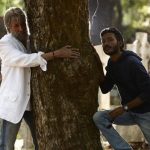Had he not fallen out with mentor Sanjay Leela Bhansali over creative differences, Vibhu Virender Puri would have made his debut with ‘Chenab Gandhi’ years ago. After Bhansali backed out of the project, Vibhu could not find any takers for the film and ended up making Hawaizaada. ‘Hawaizaada’ is a period film based on the life of scientist Shivkar Bapuji Talpade who built the first airplane in 1895, years before the Wright brothers. Ayushmann Khurrana and Rochak Kohli had collaborated as composers on all the songs sung by the former. However, they go solo with this album as Rochak composes three songs while composes one. Marathi composer Mangesh Dhakde and Vishal Bhardwaj have been credited as composer too. Vibhu, who had earlier written a couple of songs for Bhansali’s ‘Guzaarish’, writes the lyrics.
Rochak Kohli composes “Hawaizaada Dil”, a lively number that gives us a glimpse into the playful character played by Ayushmann Khurrana. The arrangements are reminiscent of the kind of music played in the era the film is set in. A plethora of live instruments have been used that add to the spirited nature of the song. Rochak sings the song with the right expressions. As the song has many layers to it, it takes some time to grow. But, once it does, you find yourself humming this charming number.
“Daak Ticket” begins with Javed Bashir singing a couple of lines in his earthy voice. The song shifts gears as Mohit Chauhan enters the scene and turns into a mellow, inspirational number. The portions that Javed Bashir sings, though nice, does not fit in with the rest of the song and as a result, comes across as something that was forced into the song just for some effect. The sufi-esque portions, rendered by him, come across as pretentious. Vibhu Puri writes some inspiring lines and after hearing phrases like ‘Sooraj ke saath jab aayenge, Khari khasta ban maska, ho! Chanda ji ko bhi lagayenge, Cutting chai ka chaska’, one realizes that the man is hugely inspired by Gulzar.
The Mangesh Dhakde composed “Maazaa My Lord” starts with an accordion piece. The instrument can be heard multiple times in this song which has an old world western orchestra feel to it. The Maharashtrian composer also brings in a flavor of Goan/Portugese music. Vibhu Puri writes some wonderful lines that reflect the banter between the two characters played by Ayushmann Khurrana and Pallavi Sharda. Mohit Chauhan and Neeti Mohan are good with their renditions.
Mirza Ghalib’s immortal ghazal “Dil-E-Nadaan” has been put to tune by different composers in the past. Ayushmann, too tries, his hand at composing the ghazal. Despite tabla and sitar being played in the background, the song has a modern, contemporary sound to it. Ayushmann sings the song well and does well as a composer too. The second interlude turns out to be more effective than the first interlude.
Mangesh Dhakde’s “Udd Jayega”, with its traditional sound and rich orchestration, reminds one of Ajay Atul’s brand of music. The music inspires you and then moves you when it reaches its crescendo with the hook line ‘Udd Jayega Hans Akela.’ The spiritual chants further help in heightening the impact of the song. Vibhu Puri seeks inspiration from Saint Kabir’s eternal poem ‘Udd Jayega Hans Akela’ and writes new lines based on that phrase. Sukhwinder Singh is fantastic and gets good support from Ranadeep Bhasker.
The last time Vishal Bhardwaj composed music for a film not written/produced/directed by him was way back in 2010. The film was ‘Striker’ and the song was ‘Yun Hua’ which sounded very similar to the title track of ‘Kaminey’. “Dil Todne Ki Masheen” is a lavani (a genre of music that finds its origins in Maharashtra) number, sung by Rekha Bhardwaj. Lavani songs are known for their powerful rhythm and this one is no different. Vishal’s music is very good with an unpredictable, softer second interlude. The song should turn out be a visual treat with the leading lady Pallavi Sharda, a trained dancer, gyrating to this number in the film.
“Yaadien Gathri Mein” is a short (1:32) number that has been derived from ‘Udd Jayega’. Harshdeep Kaur’s gorgeous vocals and the wonderfully slow and relaxed tempo of the song make you hit the repeat button several times after you hear the song.
Rochak Kohli, comes up with “Turram Khan”, another lively, happy number after ‘Hawaizaada Dil.’ This one has got a lot more quirkiness though. The playfully played banjo, the whistling and the choral vocals make the song all the more fun. The song moves back and forth between a slow and faster tempo. Papon sings the song in a fun, jovial manner. Ayushmann and Monali Thakur join in later, bringing a different flavor to the song.
Ayushmann is joined by Shweta Subram in the “Dil-E-Nadaan (Reprise)”. The song, with additional techno beats and electric guitar riffs, sounds more like a rock ballad than a semi classical number. Shweta, who sounds a bit like Shilpa Rao does not get a lot of scope but makes her presence felt nevertheless.
‘Udd Jayega’ gets a well deserving alternate version in “Teri Dua”. ‘Teri Dua’ is led by the legendary Wadali Brothers with Sukhwinder Singh, Harshdeep Kaur, Ranadeep Bhasker and Ravindra Sathe. The jugalbandi of all these vocalists is simply mesmerizing.
Hawaizaada is a very good album where almost every song brings along something to cheer the listener. It’s an album where one can’t expect the songs to make waves and climb popularity charts but the soundtrack works because it sounds uniformly good.
Rating: 3.5/5

